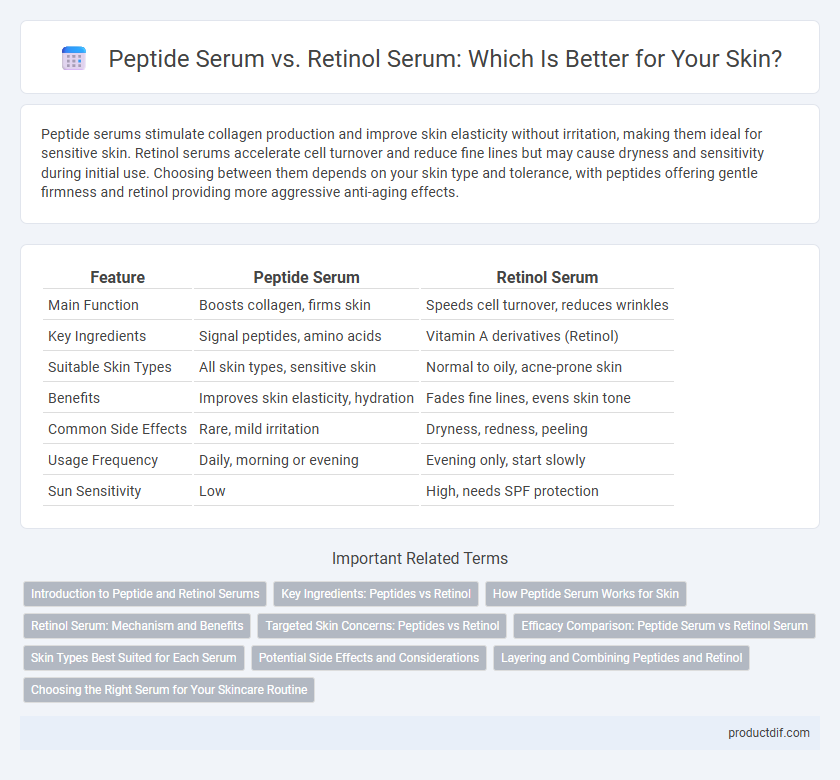Peptide serums stimulate collagen production and improve skin elasticity without irritation, making them ideal for sensitive skin. Retinol serums accelerate cell turnover and reduce fine lines but may cause dryness and sensitivity during initial use. Choosing between them depends on your skin type and tolerance, with peptides offering gentle firmness and retinol providing more aggressive anti-aging effects.
Table of Comparison
| Feature | Peptide Serum | Retinol Serum |
|---|---|---|
| Main Function | Boosts collagen, firms skin | Speeds cell turnover, reduces wrinkles |
| Key Ingredients | Signal peptides, amino acids | Vitamin A derivatives (Retinol) |
| Suitable Skin Types | All skin types, sensitive skin | Normal to oily, acne-prone skin |
| Benefits | Improves skin elasticity, hydration | Fades fine lines, evens skin tone |
| Common Side Effects | Rare, mild irritation | Dryness, redness, peeling |
| Usage Frequency | Daily, morning or evening | Evening only, start slowly |
| Sun Sensitivity | Low | High, needs SPF protection |
Introduction to Peptide and Retinol Serums
Peptide serums contain short chains of amino acids that stimulate collagen production, improving skin elasticity and hydration for a firmer, youthful appearance. Retinol serums, derived from vitamin A, accelerate cell turnover and reduce fine lines, wrinkles, and hyperpigmentation, promoting smoother and brighter skin. Both serums target aging signs but function through distinct mechanisms, with peptides supporting skin structure and retinol enhancing skin renewal.
Key Ingredients: Peptides vs Retinol
Peptide serums contain short chains of amino acids that stimulate collagen production, promote skin elasticity, and support cell repair, making them ideal for sensitive or aging skin. Retinol serums, derived from vitamin A, accelerate skin cell turnover and reduce fine lines, wrinkles, and hyperpigmentation, but may cause irritation for some skin types. Both ingredients are powerful anti-aging agents, with peptides favored for gentle nourishment and retinol for more intense skin renewal.
How Peptide Serum Works for Skin
Peptide serum works by delivering short chains of amino acids that stimulate collagen production, helping to improve skin elasticity and reduce fine lines. Its molecular structure allows peptides to penetrate the skin barrier and signal cells to repair and regenerate the skin matrix. This action promotes firmer, smoother, and more youthful-looking skin without the irritation commonly associated with retinol serums.
Retinol Serum: Mechanism and Benefits
Retinol serum works by accelerating skin cell turnover and promoting collagen production, which reduces fine lines, wrinkles, and hyperpigmentation. Its anti-aging properties improve skin texture, firmness, and brightness, making it a powerful remedy for photoaged and dull skin. Regular use enhances skin resilience and reduces acne by unclogging pores and preventing dead cell buildup.
Targeted Skin Concerns: Peptides vs Retinol
Peptide serum is highly effective for boosting collagen production and improving skin elasticity, making it ideal for reducing fine lines and promoting overall skin firmness. Retinol serum targets hyperpigmentation, acne, and wrinkles by accelerating cell turnover and stimulating collagen synthesis. Choosing between peptide and retinol serums depends on specific skin concerns like sensitivity, as peptides tend to be gentler while retinol offers more potent anti-aging and resurfacing benefits.
Efficacy Comparison: Peptide Serum vs Retinol Serum
Peptide serums stimulate collagen production and improve skin elasticity, making them effective for anti-aging without causing irritation. Retinol serums accelerate skin cell turnover and reduce fine lines and hyperpigmentation but can cause sensitivity during initial use. Overall, peptide serums offer gentle, consistent results ideal for sensitive skin, while retinol serums provide more dramatic improvements for advanced skin concerns.
Skin Types Best Suited for Each Serum
Peptide serum is ideal for sensitive and dry skin types due to its gentle, hydrating properties that support collagen production without irritation. Retinol serum suits oily and acne-prone skin by promoting cell turnover and reducing breakouts, but may cause dryness or redness on sensitive skin. Understanding skin type-specific reactions ensures optimal benefits from peptide or retinol serums in a personalized skincare routine.
Potential Side Effects and Considerations
Peptide serums generally exhibit low irritation potential, making them suitable for sensitive skin, while retinol serums can cause dryness, redness, and peeling due to their strong exfoliating properties. Users with sensitive or acne-prone skin should introduce retinol gradually and apply sunscreen daily to mitigate photosensitivity and inflammation risks. Understanding individual skin tolerance and consulting with a dermatologist ensures safe incorporation of these active ingredients into skincare routines.
Layering and Combining Peptides and Retinol
Layering peptide serum with retinol serum enhances skin repair by combining peptides' collagen-boosting properties and retinol's cell turnover benefits. To minimize irritation, apply peptide serum first to soothe and strengthen the skin barrier, followed by retinol serum to promote anti-aging effects. This combination supports a balanced skincare routine, optimizing hydration, firmness, and wrinkle reduction.
Choosing the Right Serum for Your Skincare Routine
Peptide serums stimulate collagen production and improve skin elasticity, making them ideal for sensitive skin and daily use without irritation. Retinol serums accelerate cell turnover and reduce fine lines and pigmentation, best suited for nighttime application and those targeting aging or acne-prone skin. Choosing between peptide and retinol serum depends on your skin type, concerns, and tolerance to active ingredients for optimal results in your skincare routine.
Peptide Serum vs Retinol Serum Infographic

 productdif.com
productdif.com